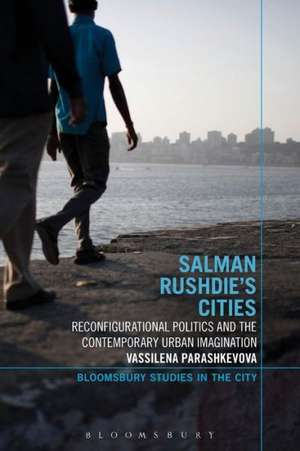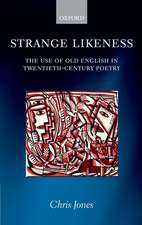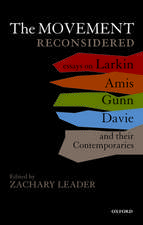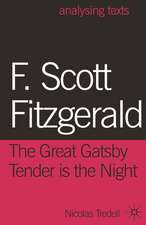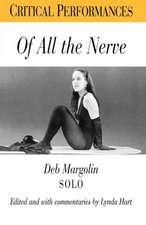Salman Rushdie's Cities: Reconfigurational Politics and the Contemporary Urban Imagination: Bloomsbury Studies in the City
Autor Vassilena Parashkevovaen Limba Engleză Paperback – 23 noi 2013
| Toate formatele și edițiile | Preț | Express |
|---|---|---|
| Paperback (1) | 257.21 lei 43-57 zile | |
| Bloomsbury Publishing – 23 noi 2013 | 257.21 lei 43-57 zile | |
| Hardback (1) | 773.81 lei 43-57 zile | |
| Bloomsbury Publishing – 15 feb 2012 | 773.81 lei 43-57 zile |
Preț: 257.21 lei
Preț vechi: 295.25 lei
-13% Nou
Puncte Express: 386
Preț estimativ în valută:
49.23€ • 53.50$ • 41.38£
49.23€ • 53.50$ • 41.38£
Carte tipărită la comandă
Livrare economică 21 aprilie-05 mai
Preluare comenzi: 021 569.72.76
Specificații
ISBN-13: 9781472527264
ISBN-10: 1472527267
Pagini: 256
Dimensiuni: 156 x 234 x 13 mm
Greutate: 0.35 kg
Editura: Bloomsbury Publishing
Colecția Bloomsbury Academic
Seria Bloomsbury Studies in the City
Locul publicării:London, United Kingdom
ISBN-10: 1472527267
Pagini: 256
Dimensiuni: 156 x 234 x 13 mm
Greutate: 0.35 kg
Editura: Bloomsbury Publishing
Colecția Bloomsbury Academic
Seria Bloomsbury Studies in the City
Locul publicării:London, United Kingdom
Caracteristici
Surveys postmodern, contemporary and postcolonial writers: Margaret Atwood, Paul Auster, Zadie Smith, Hanif Kureishi.
Notă biografică
Vassilena Parashkevova is the Bibliography Editor of the Journal of Commonwealth Literature and Postdoctoral Research Fellow/Associate Lecturer in English Literature at London South Bank University, UK.
Cuprins
Acknowledgements Abbreviations An Alphabet of Rushdie's Cities 1. Introduction: Salman Rushdie's Cities and Reconfigurational Politics 2. Partition and after: Bombay Re/beginnings and Subcontinental Twin Cities in Midnight's Children and Shame 3. Bombay, London, Jahilia: Di/versifications and Di/versions in The Satanic Verses 4. War of the Worlds: Bombay Diptychs and Triptychs in The Moor's Last Sigh 5. Quaking Solid Ground: Trojan Falls and Roman Rises in The Ground beneath Her Feet 6. Metropolitan Desires: Glocalist Seductions in Fury and Shalimar the Clown 7. Mirrors-for-cities: Florence and Fatehpur Sikri, or Machiavelli and 'the Prince' in The Enchantress of Florence Afterword: Urban Thresholds: the Respectorate of I and the Insultana of the Otter WayNotes Bibliography Index
Recenzii
Written in a lucid and compelling style, Salman Rushdie's Cities is both a major contribution to work on Rushdie's fiction and a probing investigation of the relationships between interconnected global cities. Tracing parallels across cultures, Parashkevova explores the significance of Rushdie's urban praxis for a historicized view of the 'contemporary', which stresses the political worldliness of literature.
In Salman Rushdie's Cities, Vassilena Parashkevova provides timely and theoretically astute analysis of Rushdie's representations of suchcities as Bombay, New York, Karachi, and London, arguing that his depictions are inspired by the reflective yet illusory potential of the mirror. As in the Indian embroidery tradition of mirror work (by which Rushdie himself has also been inspired), the writing and research in this important monograph is meticulously detailed and elegantly patterned.
Reading Rushdie through topographies both real and imaginary, from his idealising nostalgia for Bombay to his vision of Jahilia, has given Vassilena Parashkevova a subtle passkey to this author's polymorphous and ever-provocative mind. She has entered the invisible cities of Rushdie's fiction and political thought, with their mirror pairs of utopias and dystopias, transgressors and conservatives,transformers and self-exiles, strangers, and natives, and fashioned a lucid, learned, richly detailed and stimulating analysis, which does justice to Rushdie's brilliance and fertility, while taking cognizance of his tics and limits.
In Salman Rushdie's Cities, Vassilena Parashkevova provides timely and theoretically astute analysis of Rushdie's representations of suchcities as Bombay, New York, Karachi, and London, arguing that his depictions are inspired by the reflective yet illusory potential of the mirror. As in the Indian embroidery tradition of mirror work (by which Rushdie himself has also been inspired), the writing and research in this important monograph is meticulously detailed and elegantly patterned.
Reading Rushdie through topographies both real and imaginary, from his idealising nostalgia for Bombay to his vision of Jahilia, has given Vassilena Parashkevova a subtle passkey to this author's polymorphous and ever-provocative mind. She has entered the invisible cities of Rushdie's fiction and political thought, with their mirror pairs of utopias and dystopias, transgressors and conservatives,transformers and self-exiles, strangers, and natives, and fashioned a lucid, learned, richly detailed and stimulating analysis, which does justice to Rushdie's brilliance and fertility, while taking cognizance of his tics and limits.
